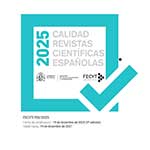Información, ética y posverdad
Resumen
La información sigue siendo, después de muchos y azarosos siglos, el fundamento esencial que ha dado lugar a la profesión periodística, siendo su razón de ser poder servir de nexo de unión entre la realidad externa y el conocimiento de los ciudadanos. Después de muchos años, y en lo que se refiere a nuestro país, la información atraviesa momentos de fuerte confusión en los tres sectores que la componen: periodistas, empresarios y público, lo que está llevando, en opinión de muchos profesionales, a una eventual desaparición de la profesión como ha sido entendida en las últimas décadas o, al menos, a una desvirtuación de sus fines proclamados desde el principio de su existencia.
En estas breves páginas, cuyo desarrollo más extenso se puede encontrar en mi libro Ética Informativa en la Era de la Posverdad, de pronta aparición, se analizan estas causas desde tres prismas fundamentales: las notas determinantes de la información, como son la verdad y la objetividad; la deontología informativa, como fundamento moral y ético de la actividad informativa y la posverdad, con su hermana gemela, las fake news, que suponen los verdaderos y más graves ataques a la información en estos momentos, en su línea de flotación, la verdad informativa.
Descarga artículo
Licencia
La revista Derecom. Derecho de la Comunicación, para fomentar el intercambio global del conocimiento, facilita el acceso sin restricciones a sus contenidos desde el momento de su publicación en la presente edición electrónica, y por eso es una revista de acceso abierto. Los originales publicados en esta revista son propiedad de la Universidad Complutense de Madrid y es obligatorio citar su procedencia en cualquier reproducción total o parcial. Todos los contenidos se distribuyen bajo una licencia de uso y distribución Creative Commons Reconocimiento 4.0 (CC BY 4.0). Esta circunstancia ha de hacerse constar expresamente de esta forma cuando sea necesario. Puede consultar la versión informativa y el texto legal de la licencia.







